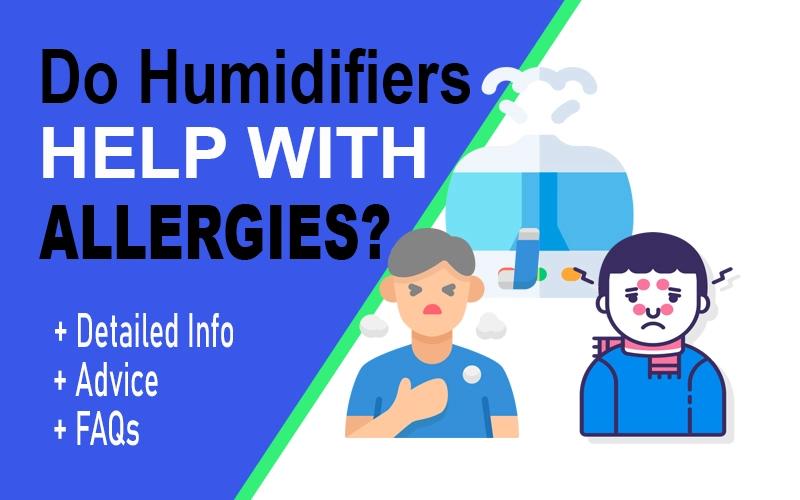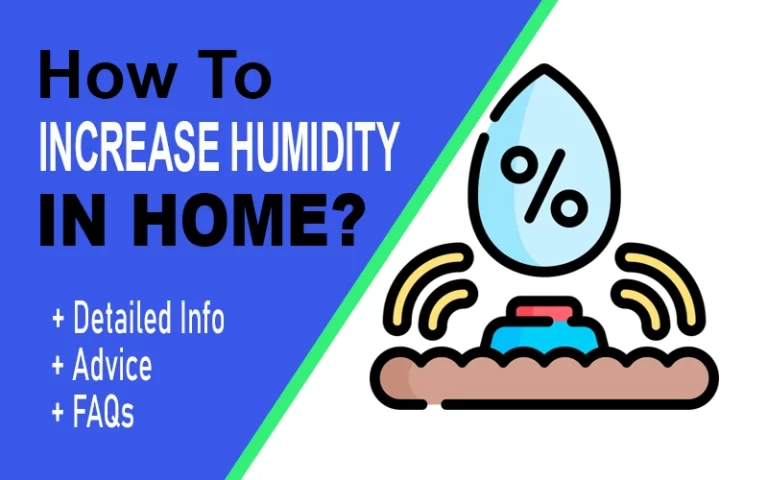Do Humidifiers Help with Allergies, Asthma and Sinus? 2023
Today I will reveal that do humidifiers help with allergies, asthma and sinus? Yes! there is some evidence that increased humidity may ease breathing in children and adults who have asthma or allergies. One study found that using a humidifier helped reduce symptoms in people with asthma and allergies. Another study found that people with allergies who used a humidifier had fewer symptoms than those who did not use a humidifier.
It is not clear exactly how humidifiers help with allergies or asthma. One theory is that humidifiers increase the moisture in the air, which helps to loosen thin mucus in the airways. This may make it easier for people to breathe. Another theory is that humidifiers help to reduce dust and other allergens in the air. If you are considering using a humidifier to help with your allergies, then don’t worry and go for it.
What are Ideal Humidity Levels?
Ideal humidity levels are typically between 30-50%. This humidity range is comfortable for most people and helps prevent problems such as static electricity, drying out of the mucous membranes, and growth of mold and bacteria.
Too much humidity (above 50%) can cause problems such as condensation on surfaces, musty odors, and mold and bacteria growth.
Too little humidity (below 30%) can cause problems such as static electricity, drying out of the mucous membranes, and increased susceptibility to respiratory infections.
The ideal humidity level can vary depending on the temperature. For example, the ideal humidity level is closer to 30% at lower temperatures, while at higher temperatures, the ideal humidity level is closer to 50%. Humidity is a measure of the amount of water vapour in the air. The higher the humidity, the more water vapour is present in the air.
Do Humidifiers Help with Allergies, Asthma and Sinus?
Do Humidifiers Help with ALLERGIES?
Humidifiers help decrease allergens in the air. Humidifiers help to relieve recurring nasal congestion and watery eyes associated with allergies. Humidifiers can mitigate allergy symptoms. Humidifiers help air to “breathe” by increasing the amount of moisture in the air. This helps air retain more moisture, which in turn, helps decrease allergy symptoms. Humidifiers are especially helpful for allergy sufferers in the winter.
Do Humidifiers Help with ASTHMA?
Humidifiers can help to moisten the air, making the air more breathable. Humidifiers may help reduce symptoms of allergy and asthma such as coughs and congestion. Humidifiers also help reduce dust in your home. Humidifiers, as well as dehumidifiers, can help improve breathing in people who suffer from asthma.
Do Humidifiers Help with SINUS?
There’s no one definite answer to that question, as the benefits and drawbacks of humidifiers depend on the nature of the individual’s sinus problems.
Many people believe that humidifiers can help improve Sinus Infection symptoms by helping to regulate air quality in the home.
A few people think that using a humidifier can be beneficial when combating fevers and improving sleep quality.
However, some people get good results by using humidifiers for their relief from Sinusitis, Nasal Congestion, and other respiratory problems
What are the Disadvantages of too Low Humidity?
There are some disadvantages of too low humidity, which are described below:
Eyes become Dry and Irritated
The disadvantages of too low humidity are many and varied. One of the most common is dry and irritated eyes. This can happen because the tear ducts cannot produce enough tears to keep the eyes lubricated. This can lead to a feeling of discomfort and even pain. In extreme cases, it can lead to corneal damage.
Tears do not properly lubricate your eyes when dry and irritated. This can lead to a number of problems, including increased sensitivity to light, difficulty focusing, and increased risk of infection. In severe cases, low humidity can even cause corneal ulcers.
Skin gets Flaky and Itchy
Our skin can become flaky and itchy when the humidity is too low. This is because the lack of moisture in the air causes our skin to dry out, forming dry, dead skin cells. These cells can flake off, leaving our skin rough and irritated. Low humidity can even lead to skin cracking and bleeding in extreme cases.
Our skin can become dry, irritated, and uncomfortable when the humidity is too low. The low humidity causes the water in our skin to evaporate more quickly, resulting in a loss of moisture and dry, flaky, and itchy skin. In extreme cases, low humidity can even cause cracks in our skin.
Irritate Your Nasal Passages and Throat:
If the humidity in your home is too low, it can irritate your nasal passages and throat. This can cause a number of problems, including:
- Dryness and itchiness of the nose and throat
- Nosebleeds
- Increased susceptibility to colds and other respiratory infections
- Hoarseness
- Coughing
The nasal passages and throat are the two main airways to enter and exit the body. The nose is the opening through which air enters the nasal passages, and the throat is the opening through which air exits the body. The nasal passages are lined with a mucous membrane, which helps to filter out dust, pollen, and other particles from the air.
The throat is also lined with a mucous membrane, which helps to protect the lungs from infection. When you breathe, the air passes through the nose and into the nasal passages. The air then travels down the throat and into the lungs. When you breathe out, the air passes out of the lungs and up the throat. The air then exits through the nose. But due to low humidity, all the processes can be damaged and difficult.
What are the Disadvantages of too Much Humidity?
There are some disadvantages of too much humidity, which are described below:
Dehydration
Dehydration is a condition that occurs when the body loses more fluids than it takes in. This can happen due to sweating, vomiting, diarrhea, or urinating more frequently than usual. Dehydration can lead to serious complications, such as heat stroke, kidney failure, and seizures. Symptoms of dehydration include thirst, dry mouth, dizziness, lightheadedness, and fatigue. If you are experiencing any of these symptoms, it is important to seek medical attention immediately.
Muscle Cramps
Muscle cramps are one of the most common disadvantages of too much humidity. They can be caused by a variety of factors, including dehydration, electrolyte imbalance, and over-exertion. Muscle cramps can be extremely painful and may cause you to stop your activity for a short period of time. If you experience muscle cramps, be sure to drink plenty of fluids and rest until the pain subsides.
Heat Exhaustion
While high humidity levels can have some disadvantages, one of the most common is heat exhaustion.
Heat exhaustion is a condition that occurs when your body is unable to cool itself properly. This can happen when you’re exposed to high temperatures for an extended period or if you’re unable to replace the fluids your body is losing through sweating.
Symptoms of heat exhaustion include heavy sweating, weakness, tiredness, headache, nausea, and vomiting. If you suspect you or someone else is suffering from heat exhaustion, it’s important to move to a cooler environment and drink plenty of fluids. If symptoms persist or worsen, seek medical attention immediately, as heat exhaustion can lead to heat stroke, a life-threatening condition.
Conclusion
If you suffer from allergies, a humidifier might be a helpful tool to reduce your symptoms. By adding moisture to the air, humidifiers can help to soothe dry throats and noses and relieve congestion. However, it’s important to clean your humidifier regularly to prevent mold and bacteria growth. If you’re unsure whether a humidifier is right for you, talk to your doctor about whether it could help relieve your allergy symptoms.


![Water Softener vs Descaler [+Differences] +Guide 2023](https://prohouseideas.com/wp-content/uploads/2022/08/water-softener-vs-descaler-768x480.webp)



![Things You Need to Know about Types Of Dehumidifiers [2023]](https://prohouseideas.com/wp-content/uploads/2023/01/types-of-dehumidifiers-768x480.webp)
![Solved – How to Clean a Dehumidifier? [+Step by Step] 2023](https://prohouseideas.com/wp-content/uploads/2023/01/how-to-clean-a-dehumidifier-768x480.webp)